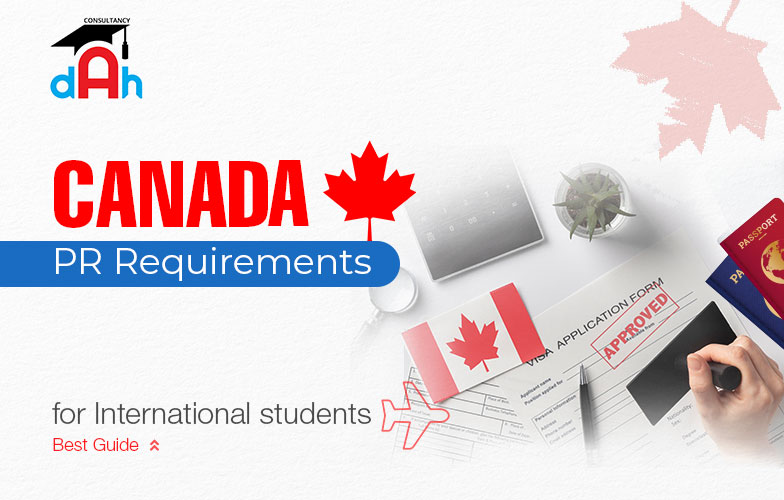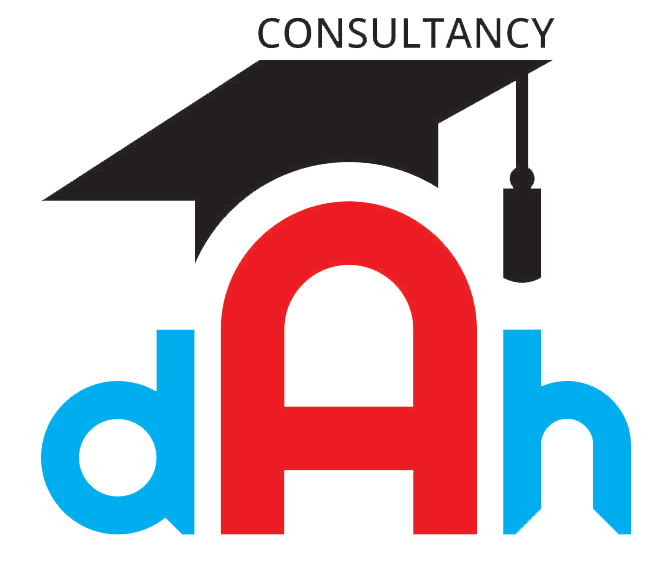Best Guide for Canada PR Requirements: Process, Eligibility, Fee, and Time

The Canada PR requirements are key information for international students who intend to study in Canada. International students can get an outstanding education and a rewarding job with Canadian PR.
While the opportunity to work in Canada is tempting, many people consider the entire procedure a daily nightmare. Read this blog further for the best guide for Canada PR requirements.
- Why Choose Canada PR among other Countries? Canada PR Benefits
- CRS points needed for Canada PR
- Canada PR Requirements for International Students
- PTE | IELTS Score required for Canada PR
- Stepwise Canada PR Process
- Canada PR Visa Processing Time
- Canada PR Application Fee 2022
- Conclusion: Canada PR Requirements
Why Choose Canada PR among other Countries? Canada PR Benefits
Canada boasts a world-class educational system. International students apply for both education and permanent residency. Canadians gain in several ways by studying and living there, and Canada is thriving in every way.
- Being able to live and work in Canada. Once you have Canada PR, you are free to move to any province or place in Canada. You are not obligated to stay with a business, a profession, or even a province.
- It enables you to travel with your family. If they become permanent residents, your family members will be entitled to reside, study, and work in Canada. However, certain individuals who are older than 18 may be sponsored.
- Free public education is something that all children are entitled to. All children of permanent residents in Canada are eligible for free education up to grade twelve (up to the age of 18).
- Healthcare for all people. Everyone in Canada with a visa for permanent residence is entitled to free medical treatment, including any prescription medications bought with tax money.
CRS points needed for Canada PR
Your ability to use the Express Entry System to become a permanent resident of Canada will be significantly impacted by your profile. The points required to submit an Express Entry application for permanent residence in Canada include the eligibility criteria, which is 67 out of 100.
You must obtain at least 67 points under several qualifying conditions to submit an Express Entry application for a Canada PR visa. The following six criteria will be used to evaluate your application, and the result will be your score.
- Age
- Education
- Experience
- Language Skills
- Employment
- Adaptability
Canada PR Requirements for International Students
There are several choices available for international students looking to complete the criteria for Canada PR. The provincial nominee program is the most preferred kind. For international students dealing with a lot of procedures, this saves time as well as makes the entire process smooth.
Manitoba Canada PR Requirements
One of the potential provincial programs available to students is in Manitoba. Three routes exist for international students to enter Manitoba: Career Employment, Graduate Internship, and Student Entrepreneur.
| Pathways | Education | Language Requirement | Adaptability | Employment Status |
| Career Employment | 3 years must have been spent enrolled in a Manitoba-designated post-secondary institution. | Minimum Canadian Language Benchmark(CLB) 7 | Must be in Manitoba throughout the application period | Should get a full-time work offer from a Manitoba firm with a least one-year contract. |
| Graduate Internship | Must have spent three years pursuing a master’s or doctorate in Manitoba. | Minimum Canadian Language Benchmark(CLB) 7 | Must stay in Manitoba for the duration of the application | Job application is not a requirement for employment. But one has to have finished a Mitacs Elevate or Accelerate internship at a Manitoban industry or research organization. |
| Student Entrepreneur | Must have finished a full-time post-secondary program in Manitoba for at least two years and be between the ages of 21 and 35. | Minimum Canadian Language Benchmark(CLB) 7 along with acceptance of IELTS | Have to remain in Manitoba following graduation | At the time of application, the applicant must possess a current work permit or post-graduation work permit (PGWP). |
British Columbia Canada PR Requirements
The British Columbia Provincial Nominee Program (BC-PNP) is quite a varied program that comes with multiple categories. The main aspect to be considered here is that it requires a job offer to get PR from this province for international graduate and international postgraduate students.
| Category | Medium | Requirement |
| International Graduate | Express Entry or skills immigration | must have completed at least one year of post-secondary education, and the role must be a skilled one. |
| International post-graduate | Express Entry or skills immigration | No work requirement; must have completed a Master’s or Ph.D. degree in a natural, applied, or health science |
Saskatchewan Canada PR Requirements
Under the Saskatchewan Immigrant Nominee Program (SINP), foreign students are admitted to Saskatchewan. Those who are interested in applying must have completed their school in Canada and have worked in Saskatchewan for at least six months. The province that accepts the lowest IELTS score is Saskatchewan.
For those applying inside Saskatchewan, candidates must have completed at least one year of post-secondary study.
Those applying from outside Saskatchewan must have earned an A certificate, A diploma, or A degree from a recognized Canadian post-secondary school in another province.
| Category | Job offer | Language Proficiency |
| Inside Saskatchewan or Outside Saskatchewan | Must have a job offer from a Saskatchewan business that is accompanied by a letter of offer and a SINP job approval letter. | None for NOC 0, A, or BCLB4 for NOC C |
Alberta Canada PR Requirements
Anyone interested in obtaining PR in this location may also consider Alberta. Through the Alberta Opportunity Stream program, students can advance. Due to the need that you live and work in Alberta, this system is different from how it operates in the other provinces.
For NOC C or D, you must have a CLB 4 language proficiency. A job offer is a major factor that serves as a bridge to Alberta. According to the Labour Market Impact Assessment LMIA), you must obtain a work permit.
The students must be employed in an appropriate job in Alberta throughout the postmarking and application evaluation. This need to line up with prior professional experience. You should have a minimum of 12 months of work experience.
Ontario Canada PR requirements
Through the Ontario Immigrant Nominee Program, students may apply. Students with Canadian educational experience are required, as well as an employment offer from an Ontario firm.
The nicest thing about this is that there is no minimum language competence requirement, making it available to anybody interested. Additionally, no prerequisite job experience is required.
There are three ways for overseas students to apply. They are graduate Ph.D. students, international masters pilot students, and international students with job offer programs.
| Category | Eligibility | Job Requirement |
| International students with a job program | Must have finished a full-time, at least 2-year diploma or degree program. | Valid full-time job offer from a Canadian employer |
| Ph.D. graduate program | Two years of the Ph.D. program at Ontario University must have been completed. | No need for a job offer |
| Pilot International Masters Graduate Program. | Must have completed a minimum of one academic year of full-time study. | No requirement for a job offer |
PTE | IELTS Score required for Canada PR
To apply for Canada PR through Express Entry, candidates must have at least a CLB 7 score in language proficiency or an overall IELTS score of 6.0. For each program, there are different language proficiency requirements.
Stepwise Canada PR Process
It’s time for a step-by-step Canadian PR procedure now that we are better knowledgeable about the various provinces and their requirements. The stepwise Canada PR process is:
Take Your Language Tests
The first thing you need to do is take the IELTS exam since it is one of the requirements to enter Canada for PR and fulfill the minimum standard set by program requirements.
Fulfill the application requirement
Check your eligibility by carefully reading the program’s requirements. Send in all required documents. Pay attention to the criteria for both jobs and education.
These include necessary items such as ready police verification records, evidence of finances, and medical examinations.
- Valid Passport
- Birth certificate
- Sponsor Letters
- Statement of Purpose
- Language proficiency scores
Following the completion of these Canada PR criteria, foreign students will receive confirmation of their PR status and receive a COPR (Confirmation of Permanent Residence) card.
Apply for a PR card
The program being pursued determines the processing time. However, depending on the date of the beginning, it may take 2 weeks to 9 months. The next step is government approval, which can take a maximum of 6-8 months.
Canada PR Visa Processing Time
The processing time for the Canada Permanent Residency (PR) Visa is 5-8 months from the moment the ITA is obtained (Invitation to Apply).
Canada PR Application Fee 2022
The principal applicant’s PR visa will cost CAD 850, plus a CAD 51 right to PR charge. A spouse, common-law partner, or family member must pay CAD 850 in addition to CAD 515 for the right to PR. 230 CAD for applicants under the age of 22.
Conclusion: Canada PR Requirements
International students with Canadian PR can pursue a world-class education as well as a rewarding career. Although the opportunity to live and work in Canada is undeniably appealing, many people regard the procedure as a daily nightmare.
Consultancy dAh can provide help and further information about the Canada PR requirements as sometimes not meeting the requirements may result in a rejection.
Related Blogs:

Leave a Reply